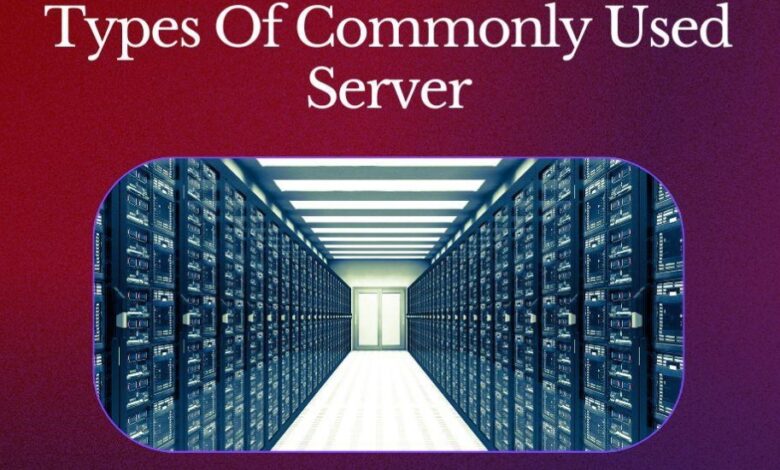Types Of Commonly Used Server: A Guide

In our modern world, servers are super important. They help with sending messages, saving stuff, putting up websites, and running apps. Get the ultimate VPS hosting experience in london with 1gbps network speed in budget-friendly options today! Whether it’s a small business or a large company, it’s important to understand the types of servers that are available. You get to decide on how you want your setup, which helps boost your confidence. Now, we will be looking at different types of commonly used servers, what they do, and why they are crucial for well-functioning businesses and communities.
What is a Server?
A server is like a helpful computer that provides services to other computers and the people using them, called clients. At times, a machine where a server program is installed is also called a server. This, however, is commonly used when the machine is in the data center where the program is running. In a computer networking configuration where there is one server and many client computers, the server program is designed to wait for client programs’ requests. They can be on the same machine or on different ones, but it doesn’t matter.
For companies that would like to scale up their server hosting, the likes of DedicatedCore and DomainRacer offer great solutions with customized solutions fit for different business needs.
Servers do lots of things like giving data to users. They can help manage a network, share files or programs, store databases, and host web pages and email. Don’t miss out on your forex VPS trading for gaming with 10X faster server which is known for seamless connectivity and lightning-fast execution. Servers are kind of like personal computers in that they have parts like a processor (CPU), memory (RAM), and a hard disk. However, servers are made with specific hardware and programs for their job. So, the type of server needed depends on what it’s supposed to do.
Types of Servers.
Here are some important types of servers used in networks:
File Servers:
Like the brick-and-mortar of the servers, the functionality of file servers is one of the main building blocks of servers. They are rather simple in nature but incredibly important in data transmission and storage on the network. Folders and files are able to be shared among them so that effective teamwork and keeping of all the data in one place is easily achieved. The data can be stored on file servers with access only for the right people; this is done to prevent unauthorized people from accessing sensitive files. They make a useful addition, for instance, where many users have to use the same files, or where data has to be backed up, for security purposes.
Web Servers:
The analogous role of web servers can be likened to the one of the hosts of the internet, in charge of displaying websites upon people’s requests. They take the browser’s orders by sending web pages back with all images and scripts involved. They are the ones who make the platform between users and website run.
Among the preferred Apache, Nginx, and Microsoft Internet Information Services (IIS) are webserver applications. The perfect example of the technology super highways which every business up scaling online must use is given by these servers, as they are the backbones of the internet enabling the websites to be seen by anyone anywhere.
Database Servers:
Database servers are just like an organized librarian; they are supers or data. They are entirely concerned with this and that- data storage, retrieval, and processing. These servers run special software known as database management systems (DBMS), which are based on different software platforms, including MySQL, Oracle, MS SQL Server, or PostgreSQL. They play the same role as the shelves and the systems that control everything and keep it organized. DedicatedCore and DomainRacer dedicated server providers have all data-based software available.
Application Servers:
Application servers are the same as the stage on which apps perform their acts. They help you to filter out applications that are not relevant to you. Imagine them as the “middlemen” between front-end Users and back-end Servers where data is kept. They store and manage the vital things that users might need like authentication, session management, and the logic of how the app works.
These servers render a plethora of programming languages and frameworks, which finally provide the developers with a smooth process of creating and launching web-based apps. One can mention among others the Apache Tomcat, JBoss, and Microsoft Internet Information Services (IIS) examples of application servers.
Mail Servers:
Mail servers, or MTAs for short, perform the mail delivery role similar to postal services of the internet. They are the ones who handle the actions related to sending, receiving, and maintaining the safety of email messages. This server is responsible for routing emails to the email program of the sender (for example, Outlook, Gmail) to another network where the addressee uses a different email program.
Mail servers, employing their own programs or protocols to complete the job, communicate with each other to get the mail to the destination. SMTP (Simple Mail Transfer Protocol) is used for sending emails and IMAP or POP3 for retrieving emails stored. These servers play a vital role in business communication as they allow businesses to be on both internal and external communication.
Virtual Servers:
Virtual servers – machines that mimic actual physical servers. These virtual resources are the counterparts of physical servers. Virtualization is about allocating resources such as power and space on just one physical server for hosting multiple virtual servers, which reduces costs. Technologies like VMware, Hyper-V, and KVM bring this to life and make virtual settings simple and convenient for companies.
Virtual servers are beneficial because they’re flexible, scalable and also hassle-free to manage. This is the main reason they are often found at the core of present-day data centers and in the cloud computing installments. Examples of the companies delivering the best virtual private server hosting are DedicatedCore and Domain Racer. Working with them, enterprises can afford to build their server infrastructure: indicatively fine-tuned to the company’s necessities.
Proxy Servers:
Proxy servers are just like those middle people who live between you and other servers on the internet. They allow you to make another machine that you haven´t met, by which you can do lots of things. Hence they give protection by making your real identity inaccessible when you browse using the internet. They can as well speed things up by making duplicates of the often-used web pages and then store them, a process called caching. They also bring their own type of filters, screening out materials you neglect.
Proxy servers are nice as a tool of controlling access to certain sites and for deciding how much bandwidth can be used. For example, some of the proxy servers that are being used around the world are Squid, Nginx, and Microsoft Forefront Threat Management Gateway (TMG).
FTP Servers:
FTP (File Transfer Protocol) servers are delivery services that are provided for files over the internet. They are designed to do that – moving files between several computers on a network that are quite far apart. With an FTP server, you can upload, download, and manage your files, thus speeding up the transmission process and providing a secure environment in which to share.
People need FTP servers very much for tasks, such as distribution of new software, sending big files, and protecting all important information. Today, the key strength of this security approach to FTP is that it does not encrypt your data. However, safer methods like FTPS (FTP Secure) and SFTP (Secure File Transfer Protocol) use encryption so your files remain safe while they are moving on to the next point.
Streaming Servers:
Streaming servers are like miraculous boxes where music and videos are transported over the web live as soon as they are ready. They simplify the process because now irrespective of the media type you can watch or listen to stuff instantly without having to download the whole file first.
These servers allow us to stream services, watch live shows, or watch on-demand. They help avoid wasting time waiting. They implement RTSP, HLS, and MPEG-DASH protocols specifically to address this issue. Also they can change their propagation speed and set according to your internet connection speed and device.
Game Servers:
Such as game servers are, these kinds of server are like the special arena where people come from different areas to play multiplayer games online together. These servers are a backbone for all the gaming process, from setting up the game and letting players join, to ensuring fair play and uninterrupted work of the game. Another item they look after includes assisting with stuff such as finding other players, communicating with teammates, and preventing cheaters from gaming.
It is worth to mention that game server software Steamworks as well as the Unreal Engine and Minecraft Server are well-known. It is them who give online gaming the ‘cool’ factor you all love!
Conclusion
In conclusion, the numerous types of servers emerging today show the variety of the needs of enterprises and organizations now. Whether it’s the files you have stored, running a website, handling databases or even helping with communication, a server is a key technology in keeping the digital world active.
Companies can decide smartly about the technical setup that they require by gaining knowledge about various kinds of servers and what they do. Because of this, they are able to do things better, faster, and more securely, in a world where all resources are interconnected.
As the best companies in VPS and Dedicated server top niche, DedicatedCore and DomainRacer, take their leadership role. Businesses can be assured they will have all the server hosting they need to keep their digital operations running smoothly.




